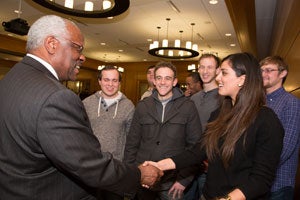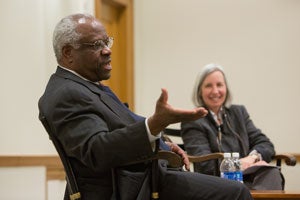Justice Clarence Thomas has become known as a quiet presence on the Supreme Court. But on Jan. 29, members of the Harvard Law School community got to hear him speak—and he did so with great humor and warmth.
As part of the Herbert W. Vaughan Lecture series, Thomas participated in a conversation with HLS Dean Martha Minow, after a day in which he met with faculty and students. In introducing Thomas—a graduate of Yale Law School—Minow said that he had turned down his admission to Harvard Law. She noted that he’d found it “too large, and if I’m right, too conservative.” This elicited laughter from the audience filling Milstein East, and a smile from Thomas—both of which recurred many times over the course of the evening.
Minow asked the justice to say something about his life as a young person. Thomas grew up poor in segregated Georgia and he recalled that although the times were difficult, he “had a good life,” and is grateful for the schooling he received, and for the “real push” he felt to be well educated.
“All of you must have someone,” he said, “who took you aside and gave you that affinity for learning, which has stuck with you.” For Thomas, it was two women working in a segregated library in Savannah. He said he still remembers the day in 1955 when he heard one of them read a story by Dr. Seuss, and he got his first glimpse of the worlds contained in books.

He also recalled with gratitude those who raised him. “I grew up with people who were not lettered. In that environment, my relatives and neighbors treasured education the way a person who was hungry would treasure food. They understood it as something they never had a chance to have.”
Minow noted that Thomas had held a great variety of legal positions before being nominated to the Supreme Court (perhaps more than many other justices), including legislative assistant to Senator John Danforth of Missouri; assistant secretary for civil rights at the U.S. Department of Education; a stint in the private sector; chairman of the Equal Employment Opportunity Commission; and judge on the U.S. Court of Appeals for the D.C. Circuit. She asked him to reflect on his career path.
Thomas said that initially he had no sense of where it was headed. “When you don’t have a model,” he said, “you just do what’s in front of you.” He likened it to when “we used to work in the fields, row after endless row of work in the sun. … You internalize that discipline to do things. I had no idea where anything would lead. I simply did my best.”
Thomas said he’s enjoyed all of the work he’s done, but he’s most enjoyed his time as a judge. He loved working on the D.C. Circuit. And about “his current job,” he said the best part is the people he’s worked with. He described a collegial atmosphere where he has respected and liked all of his colleagues over the past 21 years, although he often disagrees with many of them. Former HLS Dean Elena Kagan ’86, for example, “is just a delight,” he said. And soon after she joined the Court he told her: “It’s going to be a joy disagreeing with you for years to come.”
“You make each other better,” he said, through this sort of engagement. And he demands the same level of independent thought and civility from his law clerks. “I need people to disagree in a way that moves things forward,” he said. “That’s how you get things done.”
Minow noted that this Court is known as especially collegial, and Thomas is often cited as having much to do with that. “Then why don’t they vote with me?” he said with a chuckle. “They just kindly disagree.”
When it comes to the most useful advice he’s received on approaching his job, Thomas said it came from Judge Laurence Silberman of the D.C. Circuit. When Thomas became a circuit judge, his new colleague suggested that he approach every case with this question: What is my role in this case as a judge? Not a as a citizen, not as an activist, but as a judge?
Thomas said the opinion that is his model and that he often reads for inspiration is Justice John Marshall Harlan’s dissent in Plessy v. Ferguson, which rejected the constitutionality of state laws requiring racial segregation in public facilities under the doctrine of “separate but equal.” Growing up, “the notions expressed in that dissent were the things that we, in an unlearned way, held onto,” he said. “They told us that when all else was going in another direction, this was something that was headed the right direction.”
When Minow asked about what makes for effective advocacy before the Court, Thomas cited flexibility and thoroughness, but he put even more emphasis on honesty. “There is no advocate who wants the justices to say that he or she has been less than candid with the Court,” he said. “People are looking at you askance from then on.”
Minow asked for his views on the fact that on today’s Court, justices frequently interrupt each other with their questions. Thomas said he didn’t think it was helpful, adding that to decide a case, he didn’t think it necessary to ask so many questions. “I think we should listen to the lawyers who are arguing their case and allow the advocates to advocate.”
When Minow asked what was most challenging about his job, the justice quickly replied “the loss of anonymity.” And when she asked what he liked best, he just as quickly answered that it was his law clerks. He loves his colleagues, he said, but he really loves his law clerks. “They are my kids,” he said. “And finally,” he added, “with respect to the job, I like the idea that I get to live up to my oath.”
Among his heroes, Thomas included Justice Thurgood Marshall, but most of the people he admires, he says, are not well known. His grandfather, who raised him, is at the top of the list. Raised by freed slaves, he grew up with a dignity that the South tried to deny him. Thomas has a bust of him in his office and shared one of his favorite sayings: “Old Man Can’t is dead. I helped bury him.”
Thomas himself had words of wisdom for the law students, including: “Do well. Do well so you can be in a position to do good.”
